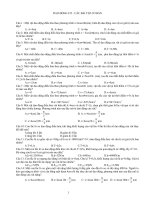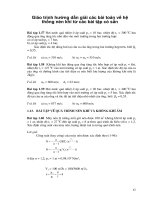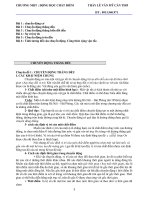- Trang chủ >>
- THPT Quốc Gia >>
- Ngoại Ngữ
CÁCH LÀM ĐỘNG TỪ KHIẾM KHUYẾT VÀ BÀI TẬP CÓ ĐÁP ÁN CHI TIẾT
Bạn đang xem bản rút gọn của tài liệu. Xem và tải ngay bản đầy đủ của tài liệu tại đây (78.4 KB, 34 trang )
MODALS
VERBS
(CONT.)
I. Modals of possibility – ĐTKT chỉ khả
năng thấp việc gì có thể xảy ra
1. Perhaps something is true now or will
happen in the future. (Có thể việc gì đúng
ở hiện tại hoặc có thể xảy ra trong tương
lai.)
S + can + Vbare infinitive
(90% chắc chắn)
S + could + Vbare infinitive
(50% chắc chắn hoặc thấp hơn)
S + may + Vbare infinitive
(50% chắc chắn hoặc thấp hơn)
S + might + Vbare infinitive
(50% chắc chắn hoặc thấp hơn)
2. Perhaps something happened in the
past. (Có thể việc gì đã xảy ra trong quá
khứ.)
S + could/ may/ might + have + PII
(50% chắc chắn hoặc thấp hơn)
Ví dụ: She looks sad. She could have heard
bad news.
(Perhaps, she has heard bad news. Or
someone might have hurt her.) (Trông cô ấy
buồn. Có thể cô ấy đã nghe được tin xấu.
Hoặc có thể ai đó đã làm tổn thương cô ấy.)
Lưu ý 1: Cấu trúc: S + could + have + PII
còn được dùng để nói về một việc gì đó đã
có thể đã xảy ra trong quá khứ nhưng thực tế
không xảy ra.
Ví dụ: Speed down. You could have hit me.
(Luckily, you didn't hit me.) (Giảm tốc độ
đi. Anh đã có thể đâm vào tôi rồi đấy. Thật
may anh đã không đâm vào tôi.)
Lưu ý 2: Không dùng ĐTKT “may” để diễn
đạt khả năng trong câu hỏi.
Ví dụ: Could it be that you don't want to
leave? (Có lẽ là bạn không muốn dời đi phải
không?)
Không nói: May it be that you don't want to
leave?
II. Modals of probability – ĐTKT chỉ khả
năng cao một việc gì có thể xảy ra
1. Something is probable now or in the
future. (Việc gì có thể xảy ra ở hiện tại
hoặc tương lai.)
Cấu trúc
1 ) S + will + Vbare infinitive (100% chắc
chắn – dự đoán)
Ex : He will come back soon.
(Anh ấy sẽ trở lại sớm.)
2) S + should + Vbare infinitive (90% chắc
chắn – mong đợi)
Ex 2 : He should do it easily.
(Anh ấy có thể làm điều đó dễ dàng.)
3) S + ought to + Vbare infinitive (90%
chắc chắn – mong đợi)
Ex 3 : He ought to be here by now.
(Anh ấy phải có mặt ở đây giờ này rồi chứ
nhỉ.)
2. Perhaps something happened in the
past. (Khả năng một việc gì đó có thể xảy
ra trong quá khứ mặc dù chúng ta không
biết nó có xảy ra hay không, nhưng chúng
ta thể hiện niềm tin khá chắc chắn về phán
đoán đó.)
S + should + have + PII
(90% chắc chắn)
S + ought to + have + PII
(90% chắc chắn)
Ví dụ:
- Has Lucy arrived home yet? (Lucy đã về
nhà chưa?)
- She should have arrived an hour ago. (We
expected but we don't know whether she
arrived home or not.)
(Cô ấy phải về nhà cách đây một giờ rồi
chứ.)
III. Modals of logical assumption – ĐTKT
chỉ sự giả định hợp lý
1. Fairly sure that sth is logically probable
to happen now/ in future or not. (Sự suy
luận có cơ sở hợp lý và khá chắc chắn
rằng điều gì có thể hoặc không thể xảy ra
ở hiện tại hoặc trong tương lai.)
S + must + Vbare infinitive
(90% chắc chắn – điều có thể)
S + can't + Vbare infinitive
(90% chắc chắn – điều không thể)
S + couldn't + Vbare infinitive
(90% chắc chắn – điều không thể)
Ví dụ: His face turns red. He must be angry.
(Mặt anh ta chuyển sang màu đỏ. Chắc chắn
là anh ta đang tức giận.)
The boy looks different from them. They
can't be his parents. (Cậu bé trông thật khác
họ. Họ không thể là cha mẹ cậu bé.)
2. Fairly sure that sth was logically
probable to happen in the past or not. (Sự
suy luận có cơ sở hợp lý và khá chắc chắn
rằng điều gì có thể hoặc không thể xảy ra
trong quá khứ.)
S + must + have + PII(90% chắc chắn –
điều có thể)
S + can't + have + PII(90% chắc chắn –
điều không thể)
S + couldn't + have + PII(90% chắc chắn –
điều không thể)
Ví dụ:
Ann was late for school. She must have
missed the bus. (Ann bị muộn học. Chắc
chắn là cô ấy đã lỡ xe buýt.)
Mark said you were full. You couldn't have
been hungry. (Mark nói rằng bạn đã no. Bạn
không thể lại đói được.)
IV. Modals of permission – ĐTKT chỉ sự
xin phép
1. Asking for permission (Sự xin phép)
Can + S + Vbare infinitive?
(thân thiện)
Could + S + Vbare infinitive?
(trang trọng hơn)
May + S + Vbare infinitive?
(rất trang trọng)
Might + S + Vbare infinitive?
(rất trang trọng)
Ví dụ:
Can I use your computer? (Tớ có thể sử
dụng máy tính của cậu không? - Bạn bè hỏi
bạn bè)
May/ Might I go out? (Em có thể ra ngoài
được không ạ? - Học sinh xin phép giáo
viên)
2. Giving permission (Sự cho phép)
Yes, you can. (Bạn có thể. - thân mật)
Yes, you may. (Bạn có thể. - trang trọng)
Sure. (Chắc chắn rồi.)
Certainly. (Chắc chắn rồi.)
Yes, of course. (Chắc chắn rồi.)
No problem. (Không vấn đề gì.)
Ví dụ:
- May I take a day off? - Yes, you can./
Certainly.
- May I park here? - Yes, of course./ Sure.
3. Refusing permission (Từ chối lời xin
phép)
No, you can't. (Bạn không thể. - thân mật)
No, you mustn't. (Bạn không được phép. sự cấm đoán)
No, you may not. (Bạn không thể. - trang
trọng)
No, I'm afraid not. (Tôi e rằng không được.)
Ví dụ:
- May I take a day off? - No, I'm afraid not.
- May I park here? – No, you mustn't.
Exercises :
Exercise 1: Complete each
sentence so that it contains
might, might not, must, mustn't,
can or can't. More than one
answer may be possible.
1. Don't stand up in the boat!
You _____ fall in the river!
2. Sue says she's stuck in traffic
and she _____ be late.
3. You really _____ start
spending more time on your
work.
4. Tell Peter he. _____ stay the
night here if he wants to.
5. That's a really stupid idea!
You _____ be serious, surely!
6. You _____ realize it, but this
is very important to me.
7. Don't be silly. You_____
expect me to believe you!
8. We're not sure but we_____
go to Prague for Christmas this
year.
9. I learn to fly! You_____ be
joking!
10. Bill cooked the lunch, so
you _____ expect anything
special!
Exercise 2: Fill in the blank
with must have been,
can’t(couldn’t) have been, have
to/had to (be) and didn’t have to
(be):
1. He knows a lot about flying
plane. He_____a pilot when he
was young.
2. Vera _____at the supermarket
this morning. I didn’t see her
there.
3. John _____at the bank until
10, so he arrived here five
minutes ago.
4. When she _____at the
hospital? Early this morning.
5. We had enough foreign
currency left at the end of the
holiday, so I _____buy any
more.
6. Monica knew exactly what to
do. I ____ tell her twice.
7. There _____an accident on
South Street because the road is
closed off.
8. I left a message on your
answer phone last night. You
_____out.
9. You _____ waiting long.
After all, I’m only five minutes
late.
10. The fire alarm went and we
_____out of the building in two
minutes.
Exercise 3: Rewrite the
following sentences using the
given words
1. I think you should give up
smoking immediately. (had)
I think
you______________________
__________________________
_________
2. It’s necessary for me to bring
my passport. (have)
I
__________________________
__________________________
_____________
3. It’s very inconvenient if you
can’t drive. (able)
__________________________
__________________________
_____________
4. I am sure that John is not the
thief. (can’t)
__________________________
__________________________
_____________
5. I am sure that the cat is in the
house somewhere. (must)
Exercise 4: Rewrite the
following sentences using the
given words
1. I’m sure that you didn’t lock
the front door. Here is the key.
You can’t
__________________________
__________________________
_______
2. It was quite unnecessary for
you to carry all those parcels
home yourself.
You______________________
__________________________
____________
3. It was careless of you to
leave the windows open last
night.
You
shouldn’t__________________
__________________________
___________
4. I’m sure it wasn’t Mrs. Mai
you saw because she is in
Boston.
It
can’t______________________
__________________________
____________
5. I’m sure Alison made
arrangement. I recognized her
voice.
It
must______________________
__________________________
____________
6. Maybe John’s working this
weekend.
John
__________________________
__________________________
________
7. I’m sure he didn’t know that
his brother was seriously ill.
He couldn’t
possibly___________________
__________________________
_____
8. I didn’t apologize. That was
wrong of me.
I
should____________________
__________________________
______________
9. I am sure it was Judy that I
saw in town this morning
It
must______________________
__________________________
____________
10. It wasn’t necessary for me
to go out after all.
I
needn’t____________________
__________________________
_____________
Exercise 5: Rewrite the
following sentences using the
given words
1. I am sure you were surprised
when you heard all the news
(must)
You
__________________________
_____when you heard the news
2. It wasn’t necessary for you to
do all this work (needn’t)
You
__________________________
_____all this work
3. Someone almost certainly
broke the window on purpose.
( must)
The window
__________________________
_____on purpose
4. I’m sure you are very tired
after working so hard. (must)
You______________________
_________ after working so
hard.
5. It is possible that one of the
men died on the mountain.
(may)
One of the men
__________________________
_____on the mountain.
6. I’m sure that you were
driving too fast (been)









